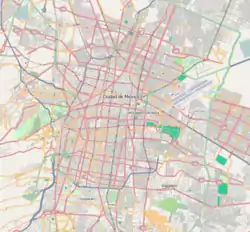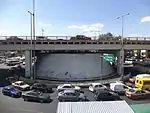Boulevard Puerto Aéreo metro station
Boulevard Puerto Aéreo metro station[lower-alpha 1] is a station of the Mexico City Metro in Venustiano Carranza, Mexico City. It is an underground station with two side platforms served by Line 1 (the Pink Line) between Balbuena and Gómez Farías stations. It serves the colonias (neighborhoods) of Moctezuma, Santa Cruz Aviación, and Valentín Gómez Farías. It lies below Puerto Aéreo Boulevard, from which it receives its name, and it is near Calzada Ignacio Zaragoza. The station's pictogram features a silhouette of an air vent below a road bridge, in reference to a landmark found at the intersection of both avenues. The station is partially accessible to people with disabilities.
| STC rapid transit | |||||||||||||||||||||||||||||||||||||||||||||||||||||||||||||||||||||||||||||||||||||||||||||||||||||||||||||||||||||||||||||||||||||||||||||||||||||||||||||||||||||||||
.jpg.webp) Station sign, 2020 | |||||||||||||||||||||||||||||||||||||||||||||||||||||||||||||||||||||||||||||||||||||||||||||||||||||||||||||||||||||||||||||||||||||||||||||||||||||||||||||||||||||||||
| General information | |||||||||||||||||||||||||||||||||||||||||||||||||||||||||||||||||||||||||||||||||||||||||||||||||||||||||||||||||||||||||||||||||||||||||||||||||||||||||||||||||||||||||
| Location | Puerto Aéreo Boulevard and Calzada Ignacio Zaragoza Venustiano Carranza, Mexico City Mexico | ||||||||||||||||||||||||||||||||||||||||||||||||||||||||||||||||||||||||||||||||||||||||||||||||||||||||||||||||||||||||||||||||||||||||||||||||||||||||||||||||||||||||
| Coordinates | 19.41967°N 99.09595°W | ||||||||||||||||||||||||||||||||||||||||||||||||||||||||||||||||||||||||||||||||||||||||||||||||||||||||||||||||||||||||||||||||||||||||||||||||||||||||||||||||||||||||
| Owned by | Government of Mexico City | ||||||||||||||||||||||||||||||||||||||||||||||||||||||||||||||||||||||||||||||||||||||||||||||||||||||||||||||||||||||||||||||||||||||||||||||||||||||||||||||||||||||||
| Operated by | Sistema de Transporte Colectivo (STC) | ||||||||||||||||||||||||||||||||||||||||||||||||||||||||||||||||||||||||||||||||||||||||||||||||||||||||||||||||||||||||||||||||||||||||||||||||||||||||||||||||||||||||
| Line(s) | |||||||||||||||||||||||||||||||||||||||||||||||||||||||||||||||||||||||||||||||||||||||||||||||||||||||||||||||||||||||||||||||||||||||||||||||||||||||||||||||||||||||||
| Platforms | 2 side platforms | ||||||||||||||||||||||||||||||||||||||||||||||||||||||||||||||||||||||||||||||||||||||||||||||||||||||||||||||||||||||||||||||||||||||||||||||||||||||||||||||||||||||||
| Tracks | 2 | ||||||||||||||||||||||||||||||||||||||||||||||||||||||||||||||||||||||||||||||||||||||||||||||||||||||||||||||||||||||||||||||||||||||||||||||||||||||||||||||||||||||||
| Connections |
| ||||||||||||||||||||||||||||||||||||||||||||||||||||||||||||||||||||||||||||||||||||||||||||||||||||||||||||||||||||||||||||||||||||||||||||||||||||||||||||||||||||||||
| Construction | |||||||||||||||||||||||||||||||||||||||||||||||||||||||||||||||||||||||||||||||||||||||||||||||||||||||||||||||||||||||||||||||||||||||||||||||||||||||||||||||||||||||||
| Structure type | Underground | ||||||||||||||||||||||||||||||||||||||||||||||||||||||||||||||||||||||||||||||||||||||||||||||||||||||||||||||||||||||||||||||||||||||||||||||||||||||||||||||||||||||||
| Accessible | Partial | ||||||||||||||||||||||||||||||||||||||||||||||||||||||||||||||||||||||||||||||||||||||||||||||||||||||||||||||||||||||||||||||||||||||||||||||||||||||||||||||||||||||||
| Other information | |||||||||||||||||||||||||||||||||||||||||||||||||||||||||||||||||||||||||||||||||||||||||||||||||||||||||||||||||||||||||||||||||||||||||||||||||||||||||||||||||||||||||
| Status | Out of service | ||||||||||||||||||||||||||||||||||||||||||||||||||||||||||||||||||||||||||||||||||||||||||||||||||||||||||||||||||||||||||||||||||||||||||||||||||||||||||||||||||||||||
| History | |||||||||||||||||||||||||||||||||||||||||||||||||||||||||||||||||||||||||||||||||||||||||||||||||||||||||||||||||||||||||||||||||||||||||||||||||||||||||||||||||||||||||
| Opened | 4 September 1969 | ||||||||||||||||||||||||||||||||||||||||||||||||||||||||||||||||||||||||||||||||||||||||||||||||||||||||||||||||||||||||||||||||||||||||||||||||||||||||||||||||||||||||
| Previous names | Aeropuerto | ||||||||||||||||||||||||||||||||||||||||||||||||||||||||||||||||||||||||||||||||||||||||||||||||||||||||||||||||||||||||||||||||||||||||||||||||||||||||||||||||||||||||
| Key dates | |||||||||||||||||||||||||||||||||||||||||||||||||||||||||||||||||||||||||||||||||||||||||||||||||||||||||||||||||||||||||||||||||||||||||||||||||||||||||||||||||||||||||
| 11 July 2022 | Temporarily closed | ||||||||||||||||||||||||||||||||||||||||||||||||||||||||||||||||||||||||||||||||||||||||||||||||||||||||||||||||||||||||||||||||||||||||||||||||||||||||||||||||||||||||
| Passengers | |||||||||||||||||||||||||||||||||||||||||||||||||||||||||||||||||||||||||||||||||||||||||||||||||||||||||||||||||||||||||||||||||||||||||||||||||||||||||||||||||||||||||
| 2022 | 2,079,119[1] | ||||||||||||||||||||||||||||||||||||||||||||||||||||||||||||||||||||||||||||||||||||||||||||||||||||||||||||||||||||||||||||||||||||||||||||||||||||||||||||||||||||||||
| Rank | 153/195[1] | ||||||||||||||||||||||||||||||||||||||||||||||||||||||||||||||||||||||||||||||||||||||||||||||||||||||||||||||||||||||||||||||||||||||||||||||||||||||||||||||||||||||||
| Services | |||||||||||||||||||||||||||||||||||||||||||||||||||||||||||||||||||||||||||||||||||||||||||||||||||||||||||||||||||||||||||||||||||||||||||||||||||||||||||||||||||||||||
| |||||||||||||||||||||||||||||||||||||||||||||||||||||||||||||||||||||||||||||||||||||||||||||||||||||||||||||||||||||||||||||||||||||||||||||||||||||||||||||||||||||||||
| |||||||||||||||||||||||||||||||||||||||||||||||||||||||||||||||||||||||||||||||||||||||||||||||||||||||||||||||||||||||||||||||||||||||||||||||||||||||||||||||||||||||||
| Location | |||||||||||||||||||||||||||||||||||||||||||||||||||||||||||||||||||||||||||||||||||||||||||||||||||||||||||||||||||||||||||||||||||||||||||||||||||||||||||||||||||||||||
 Location within Mexico City | |||||||||||||||||||||||||||||||||||||||||||||||||||||||||||||||||||||||||||||||||||||||||||||||||||||||||||||||||||||||||||||||||||||||||||||||||||||||||||||||||||||||||
| Area map and exits | |||||||||||||||||||||||||||||||||||||||||||||||||||||||||||||||||||||||||||||||||||||||||||||||||||||||||||||||||||||||||||||||||||||||||||||||||||||||||||||||||||||||||
Boulevard Puerto Aéreo station opened on 4 September 1969 as Aeropuerto metro station[lower-alpha 2] with service westward toward Chapultepec and eastward toward Zaragoza. Because the station was the closest to the Mexico City International Airport at the time of its opening, the station's former pictogram featured the silhouette of an airliner. By 1981, this function was replaced by Terminal Aérea station on Line 5 (the Yellow Line). However, due to the constant confusion of travelers, the authorities changed the name and logo of the station in 1997.
In 2019, the station had an average daily ridership of 23,095 passengers, making it the 63rd busiest station in the network and the 13th busiest of the line. Since 11 July 2022, the station has remained closed due to modernization works on the tunnel and the line's technical equipment.[2]
Location

Boulevard Puerto Aéreo is a metro station located along the avenue of the same name and Calzada Ignacio Zaragoza, in Venustiano Carranza, Mexico City.[3] The station serves the colonias (Mexican Spanish for "neighborhoods") of Moctezuma, Santa Cruz Aviación, and Valentín Gómez Farías. Within the system, the station lies between Balbuena and Gómez Farías.[3] The area is serviced by a Centro de transferencia modal (CETRAM), a type of transport hub,[4] Line 4 (formerly Line G) of the trolleybus system,[3] by Route 43 of the Red de Transporte de Pasajeros network,[5] and by Route 20-B of the city's public bus system.[6]
Exits
There are six exits.[3]
- North: Puerto Aéreo Boulevard, Santa Cruz Aviación.
- Northeast: Puerto Aéreo Boulevard, Santa Cruz Aviación.
- Northwest: Puerto Aéreo Boulevard, Moctezuma.
- South: Puerto Aéreo Boulevard, Valentín Gómez Farías.
- Southeast: Calzada Ignacio Zaragoza, Valentín Gómez Farías.
- Southwest: Puerto Aéreo Boulevard, Valentín Gómez Farías.
History and construction

Line 1 of the Mexico City Metro was built by Ingeniería de Sistemas de Transportes Metropolitano, Electrometro and Cometro, the latter a subsidiary of Empresas ICA.[7] Its first section opened on 4 September 1969, operating from Chapultepec to Zaragoza stations.[8] Boulevard Puerto Aéreo is an underground station;[9] the Boulevard Puerto Aéreo–Gómez Farías tunnel is 611 meters (2,005 ft) long, while the Boulevard Puerto Aéreo–Balbuena section measures 595 meters (1,952 ft).[10] The station is partially accessible to people with disabilities.[11] In 2016, the station received renovation works; these included repairs to ticket offices, floors, walls, ceilings, electrical installations, lighting, paging system and video surveillance system.[12]
Originally the station was named Aeropuerto as it was the closest to the Mexico City International Airport, although it is located around 15 blocks away from it.[13] Its original pictogram featured an airliner to symbolize it. In 1981, Terminal Aérea metro station on Line 5 (the Yellow Line) was built next to the airport, however, people still got off at Aeropuerto due to the confusing name and pictogram.[14][15] It was until 1997 that the station was renamed "Boulevard Puerto Aéreo" and the logo was replaced with a pictogram of a bridge with a dome below in reference to a nearby air vent found below a bridge and whose purpose is to prevent the street garbage from entering the platforms.[16]
The station has remained closed since July 2022 for modernization work on the tunnel and technical equipment of the line.[17]
Incidents
On 2 June 2021, the station received a bomb threat. After six hours of examinations, the Secretariat of Security discarded the existence of explosives.[18]
Ridership
According to the data provided by the authorities since the 2000s, and before the impact of the COVID-19 pandemic on public transport, commuters averaged per year between 22,800 and 30,300 daily entrances between 2013 and 2019; the station had a ridership of 8,429,972 passengers in 2019,[19] which was an increase of 78,230 passengers compared to 2018.[20] Also in 2019, Boulevard Puerto Aéreo metro station was the 63rd busiest station of the system's 195 stations, and it was the line's 13th busiest.[19]
| Annual passenger ridership | |||||
|---|---|---|---|---|---|
| Year | Ridership | Average daily | Rank | % change | Ref. |
| 2022 | 2,079,119 | 5,696 | 153/195 | −61.98% | [1] |
| 2021 | 5,468,560 | 14,982 | 43/195 | −0.87% | [21] |
| 2020 | 5,516,422 | 15,072 | 50/195 | −34.56% | [22] |
| 2019 | 8,429,972 | 23,095 | 63/195 | +0.94% | [19] |
| 2018 | 8,351,742 | 22,881 | 70/195 | −7.33% | [20] |
| 2017 | 9,012,202 | 24,690 | 56/195 | −6.74% | [23] |
| 2016 | 9,663,402 | 26,402 | 51/195 | −10.44% | [24] |
| 2015 | 10,789,494 | 29,560 | 46/195 | +0.19% | [25] |
| 2014 | 10,768,640 | 29,503 | 44/195 | −2.36% | [26] |
| 2013 | 11,028,780 | 30,215 | 46/195 | −30.88% | [27] |
Notes
- Estación del Metro Boulevard Puerto Aéreo. Spanish pronunciation: [buleˈβaɾ(ð) ˈpweɾto aˈeɾeo] ⓘ. The name of the station literally means "Air Port Boulevard" in Spanish.
- Estación del Metro Aeropuerto. Spanish pronunciation: [a.e.ɾoˈpweɾ.to] ⓘ. The former name of the station literally meant "Airport" in Spanish.
References
- "Afluencia de estación por línea 2022" [Station traffic per line 2022] (in Spanish). Sistema Transporte Colectivo Metro. 2023. Archived from the original on 5 March 2023. Retrieved 5 March 2023.
- "La L1 del Metro de CDMX cerrará de Pantitlán a Salto del Agua, desde el 11 de julio". La Lista (in Spanish). 27 June 2022. Retrieved 27 June 2022.
- "Boulevard Puerto Aéreo" (in Spanish). Sistema de Transporte Colectivo Metro. Archived from the original on 11 April 2021. Retrieved 29 October 2021.
- "Centros de Transferencia Modal (CETRAM): Alcaldía Venustiano Carranza" [Modal Transfer Centers: Venustiano Carranza Borough] (in Spanish). Órgano Regulador de Transporte. Retrieved 1 November 2021.
- "Red de Rutas" [Routes network] (in Spanish). Red de Transporte de Pasajeros. Retrieved 30 October 2021.
- "Red de corredores" [Route network] (in Spanish). Retrieved 30 October 2021.
- "Línea 1, Ciudad de México" [Line 1, Mexico City] (in Spanish). iNGENET Infraestructura. 20 July 2009. Archived from the original on 19 July 2021. Retrieved 25 September 2021.
- "Los primeros usuarios del Metro" [The first Metro passengers]. El Universal (in Spanish). 5 September 2019. Archived from the original on 25 September 2021. Retrieved 25 September 2021.
- Zamarrón, Israel (2 September 2021). "En declive y con 52 años, la Línea 1 del Metro apunta hacia los trenes autónomos" [In decline and 52 years old, Metro Line 1 is aiming for autonomous trains]. Forbes (in Spanish). Archived from the original on 2 September 2021. Retrieved 29 October 2021.
- "Longitud de estación a estación por línea" [Station-to-station length per line] (in Spanish). Sistema de Transporte Colectivo Metro. Archived from the original on 4 May 2021. Retrieved 12 July 2021.
- "Mi Mapa Metro 22032021" [My Metro Map 22032021] (PDF) (in Spanish). Sistema Transporte Colectivo Metro. 22 March 2021. Retrieved 30 October 2021.
- Rodea, Felipe (10 April 2016). "Metro anuncia cierre parcial de estaciones Insurgentes, Moctezuma y Boulevard Puerto Aéreo" [Metro announces partial closure of Insurgentes, Moctezuma and Boulevard Puerto Aereo stations]. El Financiero (in Spanish). Archived from the original on 29 October 2021. Retrieved 29 October 2021.
- Asociación del Congreso Panamericano de Ferrocarriles (1975). Boletín de la Comisión Permanente [Newsletter of the Permanent Commission] (in Spanish). Vol. 58. p. 154.
- Noble, John; Bernhardson, Wayne (1995). Mexico (5 ed.). Hawthorn, Victoria: Lonely Planet. p. 219. ISBN 0864422911.
- Wood, Andrew G. (2003). Pilcher, Jeffrey M. (ed.). The Human Tradition in Mexico. Wilmington, Delaware: SR Books. p. 185. ISBN 0-8420-2975-3.
- Santos Gallagher, Hugo (14 July 2017). "¿Por qué algunas estaciones del Metro cambiaron de nombre?" [Why the names of some stations were changed?]. El Universal (in Spanish). Archived from the original on 5 August 2018. Retrieved 16 April 2020.
- González, Juan Pablo (23 September 2021). "Cerrarán parcialmente la Línea 1 del Metro durante el primer semestre del 2022" [Metro Line 1 will be partially closed during the first half of 2022]. Noticieros Televisa (in Spanish). Archived from the original on 24 September 2021. Retrieved 25 September 2021.
- "Estación del Metro Boulevard Puerto Aéreo reabre tras amenaza de bomba" [Boulevard Puerto Aéreo metro station reopens after bomb threat]. El Financiero (in Spanish). 2 June 2021. Archived from the original on 2 June 2021. Retrieved 2 November 2021.
- "Afluencia de estación por línea 2019" [Station traffic per line 2019] (in Spanish). Sistema Transporte Colectivo Metro. 2020. Archived from the original on 8 April 2020. Retrieved 3 May 2020.
- "Afluencia de estación por línea 2018" [Station traffic per line 2018] (in Spanish). Sistema Transporte Colectivo Metro. 2019. Archived from the original on 6 June 2019. Retrieved 7 April 2020.
- "Afluencia de estación por línea 2021" [Station traffic per line 2021] (in Spanish). Sistema Transporte Colectivo Metro. 2022. Archived from the original on 7 March 2022. Retrieved 7 March 2022.
- "Afluencia de estación por línea 2020" [Station traffic per line 2020] (in Spanish). Sistema Transporte Colectivo Metro. 2021. Archived from the original on 21 June 2021. Retrieved 21 June 2021.
- "Afluencia de estación por línea 2017" [Station traffic per line 2017] (in Spanish). Sistema Transporte Colectivo Metro. 2019. Archived from the original on 3 May 2020. Retrieved 3 May 2020.
- "Afluencia de estación por línea 2016" [Station traffic per line 2016] (in Spanish). Sistema Transporte Colectivo Metro. 2017. Archived from the original on 3 May 2020. Retrieved 3 May 2020.
- "Afluencia de estación por línea 2015" [Station traffic per line 2015] (in Spanish). Sistema Transporte Colectivo Metro. 2016. Archived from the original on 3 May 2020. Retrieved 6 May 2020.
- "Afluencia de estación por línea 2014" [Station traffic per line 2014] (in Spanish). Sistema Transporte Colectivo Metro. 2015. Archived from the original on 3 May 2020. Retrieved 6 May 2020.
- "Afluencia de estación por línea 2013" [Station traffic per line 2013] (in Spanish). Sistema Transporte Colectivo Metro. 2014. Archived from the original on 3 May 2020. Retrieved 6 May 2020.
External links
 Media related to Boulevard Puerto Aéreo (station) at Wikimedia Commons
Media related to Boulevard Puerto Aéreo (station) at Wikimedia Commons- "Metro Boulevard Puerto Aéreo". At the Official Guide to Mexico City.